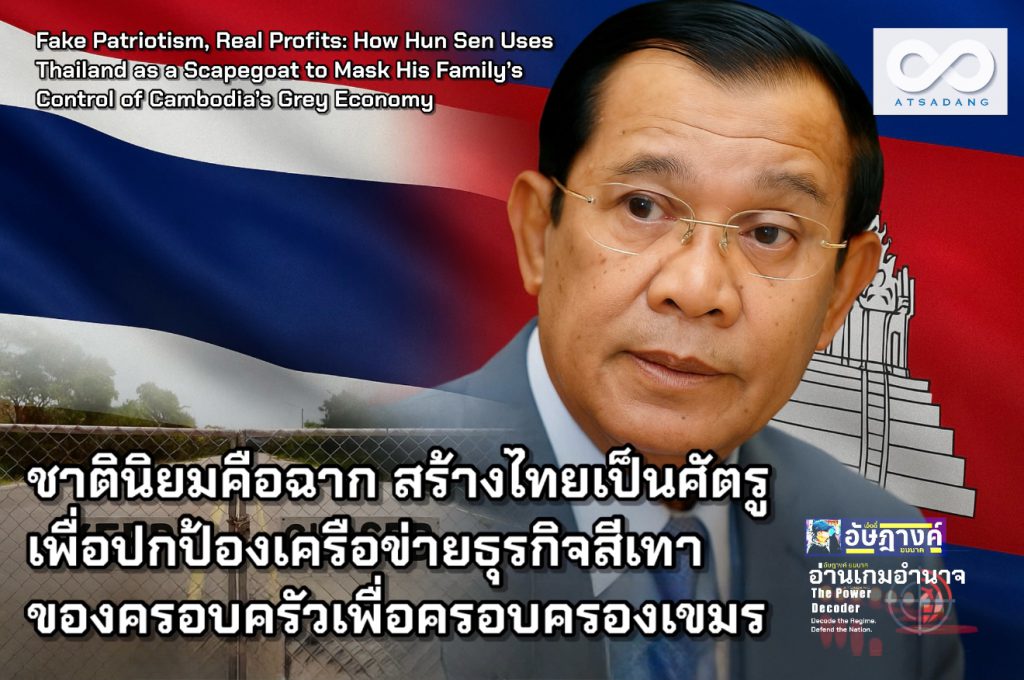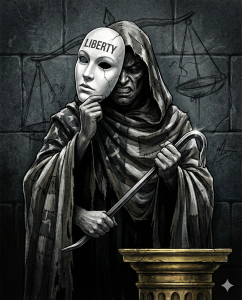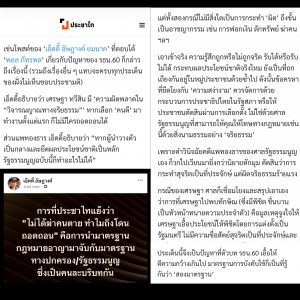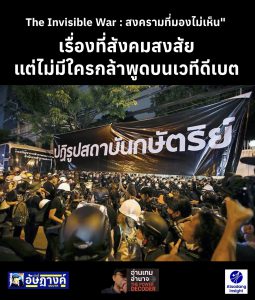
ชาตินิยมคือฉาก สร้างไทยเป็นศัตรูเพื่อปกป้องเครือข่ายธุรกิจสีเทาของครอบครัวเพื่อครอบครองเขมร
#อัษฎางค์ยมนาค #อ่านเกมอำนาจ #ตีกลับเขมร
ใครได้รับผลกระทบมากกว่ากัน ระหว่างไทยหรือกัมพูชา จากคำขู่ของสมเด็จฮุน เซน ที่ระบุว่า หากไทยไม่เปิดด่านตามข้อเรียกร้อง กัมพูชาจะ “ระงับการนำเข้าสินค้าจากประเทศไทยทั้งหมด”
→ คำตอบคือ:
กัมพูชาเป็นฝ่ายเสียเปรียบมากกว่า หากดำเนินมาตรการตัดการค้านำเข้าสินค้าจากไทยอย่างที่ขู่ไว้ เพราะจะกระทบต่อเสถียรภาพเศรษฐกิจภายในประเทศตัวเองอย่างรุนแรง ในขณะที่ไทยสามารถปรับตัวได้ และยังถือไพ่ในเชิงยุทธศาสตร์
การออกคำขู่เช่นนี้จึงสะท้อน แรงกดดันเชิงอำนาจที่กัมพูชากำลังพยายามพลิกเกม มากกว่าการถืออำนาจต่อรองที่แท้จริง
→ คำตอบในเชิงยุทธศาสตร์และเศรษฐกิจมีดังนี้:
▍1. กัมพูชาจะเสียหายมากกว่าในภาพรวม
• การค้าชายแดนไทย–กัมพูชา มีมูลค่าสูงกว่า 100,000 ล้านบาทต่อปี โดย “ไทยเป็นฝ่ายส่งออก” ไปยังกัมพูชามากกว่าที่นำเข้า
• กัมพูชาพึ่งพาสินค้าจำเป็นจากไทยเป็นจำนวนมาก เช่น:
• น้ำมันเชื้อเพลิง
• อาหารแปรรูปและสินค้าอุปโภค
• วัสดุก่อสร้าง ยา เวชภัณฑ์
• หากกัมพูชาหยุดนำเข้าสินค้าจากไทย:
• จะเกิด “ปัญหาความขาดแคลน” ภายในประเทศ
• ทำให้ต้นทุนสินค้าในประเทศกัมพูชาสูงขึ้นทันที
• ส่งผลกระทบต่อเสถียรภาพของรัฐบาลฮุนมาเนตด้วย
▍2. ไทยกระทบในระยะสั้น แต่ไม่ถึงขั้นวิกฤต
• ไทยส่งออกสินค้าหลายหมวดไปยังกัมพูชา แต่ กัมพูชาเป็นตลาดรอง ไม่ใช่ตลาดหลัก
• ผู้ส่งออกไทยสามารถเบี่ยงเส้นทางหรือปรับตลาดได้ดีกว่า
• ผลกระทบอาจเกิดขึ้นกับพื้นที่ชายแดนบางจังหวัด เช่น สระแก้ว สุรินทร์ อุบลฯ แต่เป็น “ระดับท้องถิ่น” มากกว่า “ระดับชาติ”
▍3. คำขู่นี้จึงเป็น “ยุทธศาสตร์กดดันเชิงสัญลักษณ์” มากกว่าเป็นจริง
• ฮุน เซน อาจใช้คำขู่นี้เพื่อ:
• กดดันให้ไทยเปิดด่านตามข้อเรียกร้องของกัมพูชา (ซึ่งอาจเกี่ยวโยงกับผลประโยชน์ด้านอาชญากรรม / ระบบเศรษฐกิจใต้ดิน)
• สร้าง narrative ให้กัมพูชาเป็นฝ่ายที่ “เสียเปรียบ” และเรียกร้องความเห็นใจจากนานาชาติ
→ ทั้งหมดนั่น ผู้นำเขมร เพียงแค่สร้างภาพกับประชาชนของตน
→ การสร้างภาพเพื่อการเมืองภายใน:
เป้าหมายหลักไม่ใช่ไทย…แต่คือประชาชนกัมพูชาเอง
▍1. สร้างภาพ “ผู้นำเข้มแข็ง–ไม่เกรงใจไทย”
• ผู้นำเขมรต้องการส่งสารว่า “กัมพูชาไม่ใช่ประเทศเล็กที่ยอมสยบต่อไทย”
• เป็นการใช้ “การเผชิญหน้ากับประเทศเพื่อนบ้านที่ใหญ่กว่า” เพื่อเสริมภาพลักษณ์ความกล้าหาญของผู้นำ
▍ 2. ใช้ประเด็นชายแดนปลุกความรู้สึกชาตินิยม
• ในช่วงที่เศรษฐกิจในประเทศกำลังเผชิญปัญหา (เช่น เรื่องการท่องเที่ยว คาสิโนผิดกฎหมาย หรือแรงงาน) การปลุก “ศัตรูภายนอก” คือสูตรคลาสสิกที่ใช้เบี่ยงเบนความสนใจ
• ไทยกลายเป็นตัวละครที่เหมาะสม เพราะมีประวัติความขัดแย้งทางประวัติศาสตร์ และ “จุดร่วมทางอารมณ์” ในใจคนเขมรจำนวนมาก
▍ 3. สร้างอำนาจต่อรองจากภาวะขัดแย้ง
• การสร้าง “เกมความตึงเครียด” อาจถูกใช้เป็นเครื่องมือในการเจรจาลับ เช่น เรียกร้องเรื่องเปิดด่านบางจุด หรือหลีกเลี่ยงการตรวจสอบกิจกรรมผิดกฎหมายในเขตแดน
▍ บทสรุปเชิงวิเคราะห์:
“คำขู่ไทย” ของฮุน เซน ไม่ใช่เครื่องมือทางเศรษฐกิจ แต่คือ กลยุทธ์ทางการเมืองเพื่อสร้างความชอบธรรมให้กับรัฐบาลกัมพูชาในสายตาประชาชนตนเอง
โดย วาดภาพไทยเป็นฝ่ายกดขี่ หรือไร้น้ำใจทางการทูต เพื่อทำให้กัมพูชาดูเหมือนเป็น “ผู้กล้า–ผู้ถูกกระทำ” และยกระดับความนิยมของผู้นำ ผ่านนโยบายแข็งกร้าว
Fake Patriotism, Real Profits: How Hun Sen Turns Thailand into a Scapegoat to Shield His Family’s Grey Empire
#EddieAtsadang #PowerDecoder #PushBackAgainstHun
Who Really Loses in Hun Sen’s Trade Threats? Cambodia, Not Thailand.
When Cambodia’s strongman Hun Sen threatened to suspend all imports from Thailand unless border checkpoints were reopened on his terms, many wondered—who stands to lose more?
→ The answer is strategic and clear: Cambodia has far more to lose.
While Thailand may face some short-term disruptions, Cambodia’s economy would suffer severe internal consequences, exposing the bluff behind Hun Sen’s threats.
▍1. Cambodia’s Economic Vulnerability
• Thailand–Cambodia border trade exceeds 100 billion baht annually, with Thailand being the net exporter.
• Cambodia relies heavily on Thai imports:
– Fuel and energy
– Processed food and consumer goods
– Construction materials and medical supplies
• Cutting off imports would trigger domestic shortages, spike consumer prices, and shake the internal stability of Hun Manet’s administration.
▍2. Limited Impact on Thailand
• Cambodia is not a primary export market for Thailand.
• Thai exporters can reroute or shift markets with greater resilience.
• Impacts would be localized to border provinces (e.g., Sa Kaeo, Surin, Ubon), not national-level shocks.
▍3. Strategic Theater, Not Real Leverage
This is a symbolic pressure tactic, not genuine economic leverage.
• The real goal is to coerce Thailand into concessions (possibly related to grey economy interests at the border).
• Hun Sen is crafting a narrative of victimhood and nationalist defiance to distract from domestic challenges.
◾ It’s not about Thailand—It’s about Cambodian public opinion.
▍1. Fabricating a “Strong Leader” Image
• The message to Cambodians: “We’re not Thailand’s subordinate.”
• Facing domestic discontent, Hun Sen leans into the classic tactic of confronting a bigger neighbor to boost personal stature.
▍2. Weaponizing Border Tensions to Stir Nationalism
• Amid economic woes (illegal casinos, weak tourism, labor instability), creating an external enemy is an old trick to shift blame.
• Thailand is a convenient “historical rival” that still carries emotional weight among Cambodians.
▍3. Manufacturing Leverage for Hidden Deals
• Rising tensions may be used to pressure Thailand in backdoor negotiations: from reopening select checkpoints to overlooking cross-border illicit activity.
▍Strategic Conclusion:
Hun Sen’s threats are not economic tools—they’re political theater.
By turning Thailand into the villain, Cambodia’s ruling family diverts attention from their entrenched corruption and consolidates power under the guise of nationalism.
What appears to be tough diplomacy is, in fact, a smokescreen—for domestic failures, for transborder illicit networks, and for one family’s grip on an entire nation.



